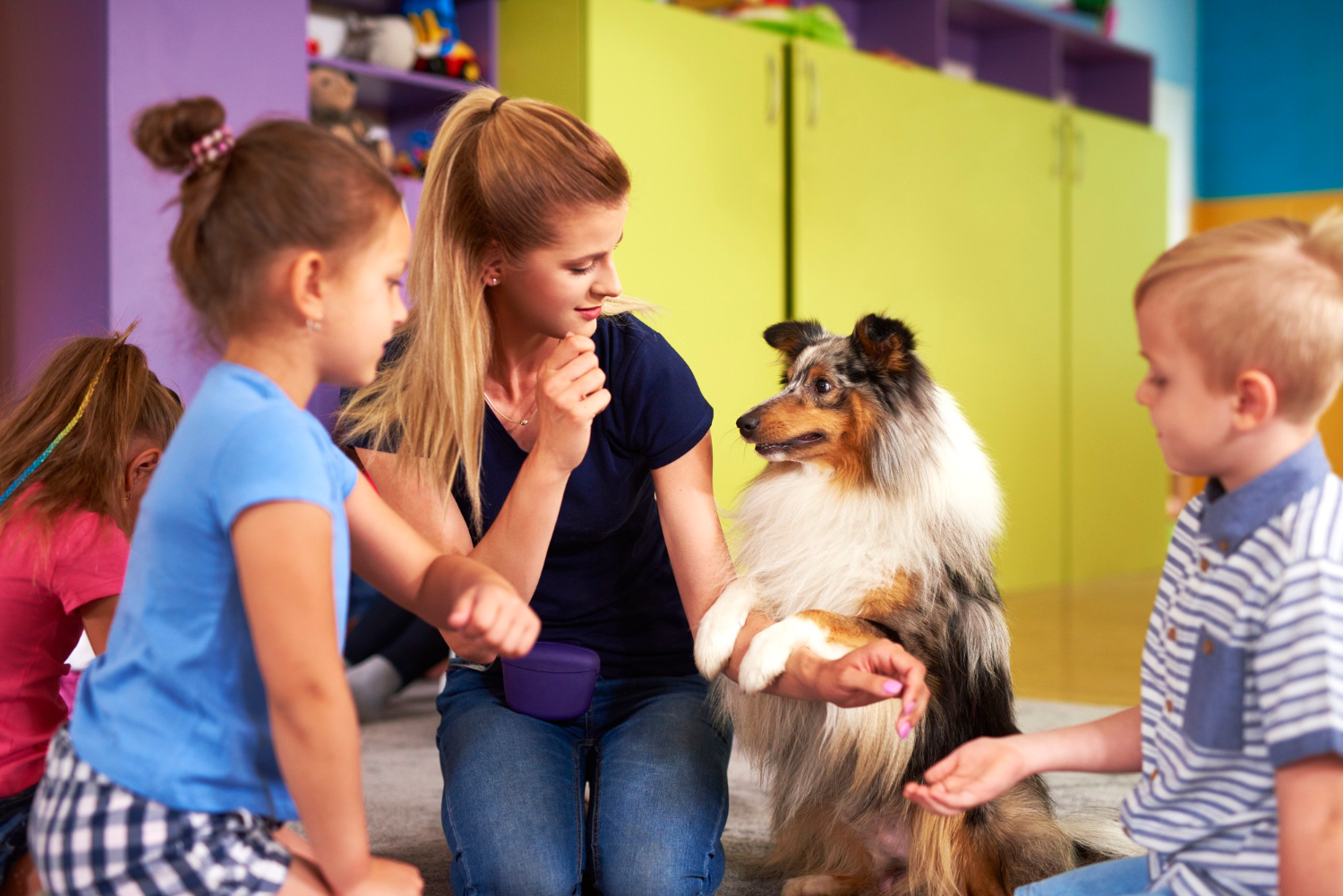Finding a suitable doggy daycare near me can make a significant difference in a pet owner’s daily routine. Doggy daycare offers a safe and fun environment where dogs can socialize and play while their owners are busy or at work. This option provides mental stimulation and physical activity, which are essential for a dog’s well-being.
Choosing the right daycare requires some research. Pet owners should consider factors like location, services offered, and reviews from other dog owners. Visiting facilities can also help ensure that the environment meets their expectations and that their pet will be comfortable.
In this article, readers will discover the many benefits of doggy daycare, including how to choose the best option for their pets. Real experiences from other owners will guide them through what to expect during their first visit.
Key Takeaways
- Doggy daycare ensures dogs are socialized and active while owners are away.
- Researching options helps find a safe and suitable daycare for pets.
- Knowing what to expect can ease the transition for first-time visitors.
Benefits of Doggy Daycare
Doggy daycare provides valuable benefits for dogs and their owners. These facilities not only enhance social skills but also ensure regular exercise and professional care, catering to the individual needs of each dog.
Socialization Opportunities
Socialization is crucial for a dog’s well-being. At doggy daycare, dogs interact with other canines in a controlled setting. This helps them learn healthy social behaviors and communication skills.
During playtime, dogs experience different personalities and energy levels. Such interactions can reduce fear and anxiety, especially for dogs who may be shy or reserved.
Regular exposure to various dogs can also prepare them for outings in public spaces. This social experience contributes to a more balanced and well-adjusted pet.
Regular Exercise
Exercise is vital for maintaining a dog’s physical and mental health. Doggy daycare offers an active environment where dogs frequently engage in play.
Dogs can run, jump, and play with toys. This type of exercise helps prevent obesity and related health issues. Active dogs typically exhibit less behavioral problems due to the outlet for their energy.
Structured activities are often planned throughout the day. These activities not only keep the dogs moving but also provide mental stimulation, enhancing their overall well-being.
Professional Care
At doggy daycare, dogs receive professional supervision and care. Trained staff monitor dogs during play to ensure safety and manage any conflicts.
These facilities often require vaccinations to protect the health of all pets involved. This ensures a safer environment for both the dogs and the staff.
Staff members can also identify potential issues, such as anxiety or aggression. Early intervention can lead to better behavior management and a happier dog. Having professionals caring for the dog allows owners to feel confident that their pet is in good hands.
Choosing the Right Doggy Daycare
Selecting a doggy daycare requires careful evaluation of several factors. A thorough understanding of the facility, staff qualifications, and safety standards will help ensure a positive experience for dogs and their owners.
Facility Tour
When choosing a doggy daycare, a facility tour is essential. It allows owners to see the environment where their dogs will be spending time. During the tour, pay attention to cleanliness and organization. A well-kept space is important for the health and safety of the dogs.
Look for areas designated for different size groups. This ensures that small dogs and large dogs are kept separate, reducing the risk of accidents or stress. Outdoor spaces should be secure, offering plenty of room for exercise and play.
Don’t hesitate to ask about the daily schedule. A structured routine helps dogs feel secure. Observe how staff interacts with dogs. Caring and attentive staff is crucial for a positive experience.
Staff Qualifications
The qualifications of the staff can significantly impact the quality of care provided. Ideally, staff members should possess certifications in pet care or training. This includes knowledge of animal behavior and basic first aid. Proper training helps staff recognize signs of stress or aggression in dogs.
Consider the staff-to-dog ratio. A lower ratio means more individual attention for each dog. This is especially important for socialization and playtime. Inquire about staff training programs and ongoing education. Continuous learning ensures that the staff stays updated on best practices.
Ask if staff members have experience with different breeds, as each breed may have unique needs. The more knowledgeable the staff, the better they can cater to each dog’s requirements.
Safety Standards
Safety is paramount in any doggy daycare. Owners should confirm that the facility has clear safety protocols in place. This includes regular health checks and vaccination requirements for all dogs. Ensuring that all dogs are up-to-date on vaccines helps prevent the spread of illness.
Look for secure fencing around outdoor areas to prevent escapes. Supervision should be constant to ensure that any potential issues are addressed quickly. Ask about emergency plans in case of an incident.
Find out what kind of training staff undergo to handle dog behavior issues. Well-trained staff will manage conflicts calmly and effectively. They should know how to handle emergencies, such as allergies or injuries.
A thorough evaluation of the facility, staff qualifications, and safety standards will help ensure a dog’s well-being in daycare.
Services Offered
Many doggy daycares provide a variety of services tailored to the needs of dogs and their owners. These services can enhance the experience for pets, ensuring they receive care, engagement, and support throughout the day. Below are some common offerings available at these facilities.
Day Boarding
Day boarding is a popular choice for pet owners who need a safe space for their dogs during the day. Facilities often provide structured environments where dogs can interact with peers.
Many daycares separate dogs by size, age, and energy levels. This ensures safe and enjoyable playtime.
Amenities typically include:
- Spacious play areas
- Supervised activities
- Nap times for relaxation
Day boarding is designed to keep dogs engaged and active while owners are away.
Grooming Services
Grooming services are essential for maintaining a dog’s hygiene and appearance. Many doggy daycares offer professional grooming options, which can include bathing, nail trimming, and fur styling.
Grooming is important for several reasons:
- Health: Regular grooming can help prevent skin issues and matting.
- Comfort: A clean dog is often more comfortable, especially in warmer weather.
- Aesthetics: Grooming keeps a dog looking well-maintained.
Most facilities use pet-friendly products and have trained staff to ensure a positive experience for every dog.
Behavioral Training
Behavioral training programs are beneficial for dogs of all ages. Many daycares offer training sessions led by certified trainers.
Training focuses on various aspects, such as:
- Basic commands (sit, stay, come)
- Socialization skills
- Addressing behavioral issues
Sessions often combine play and learning, making the process enjoyable.
Investing in training can lead to well-rounded pets. This can improve the bond between the dog and its owner.
What to Expect
Leaving a dog at daycare can be a new experience for both pets and their owners. Understanding the daily routine and care provided can ease any concerns.
Daily Schedule
At doggy daycare, a dog’s day is usually structured. Each facility may have a slightly different schedule, but many include similar activities.
Morning Activities:
- Arrival and check-in
- Group playtime in a safe environment
- Socialization with other dogs and staff
Midday Routine:
- Snack time for energy
- Quiet rest period or nap after play
Afternoon Activities:
- More playtime, often involving outdoor activities
- Training exercises to reinforce good behavior
A well-organized schedule ensures each dog gets enough exercise and social interaction. This can help reduce anxiety and promote overall well-being.
Feeding and Care
Feeding routines vary, but most daycares accommodate dietary needs. Owners should inform the daycare staff about their dog’s typical feeding schedule and any food restrictions.
- Meal Times: Daycares often have designated feeding times. Dogs that need meals brought from home should have them clearly labeled.
- Health Monitoring: Staff will keep an eye on each dog’s health. If a dog seems unwell or acts differently, the staff will communicate with the owner.
- Hydration: Regular access to fresh water is available all day. Dogs can get thirsty after active play, so this is vital.
Understanding these aspects can help owners feel more comfortable when choosing a daycare for their pets.
Tips for First-Time Visitors
Visiting a doggy daycare for the first time can be exciting yet a bit daunting. Proper preparation and understanding the adjustment period will ease concerns and help create a positive experience for both the dog and the owner.
Preparation Checklist
Before the first visit, it’s essential to prepare both the dog and the owner. Here are key steps to follow:
- Research Daycares: Choose a facility that fits your dog’s needs. Look for cleanliness and safety features.
- Plan a Visit: Schedule a tour to see the environment and meet the staff. This visit can help assess if it’s the right fit.
- Vaccinations: Ensure the dog is up to date on vaccinations, as many daycares require proof.
- Bring Familiar Items: Pack a favorite toy or blanket to help the dog feel secure.
- Feeding Schedule: Stick to the dog’s regular feeding routines. Avoid introducing new food just before daycare.
Being well-prepared will help ease anxiety on the first day for both the pet and the owner.
Adjustment Period
The adjustment period is crucial for a dog’s comfort in a new environment. It may take time for the dog to adapt to the daycare setting.
- Initial Reactions: Dogs may react differently. Some might be excited, while others could seem nervous or withdrawn initially.
- Active Play: Engaging in active play helps dogs socialize and reduces stress. It is common for dogs to be tired after a busy day.
- Monitoring Behavior: Owners should monitor their dog’s behavior during the first few visits. Signs of discomfort may include excessive barking or hiding.
- Stay Calm: Keeping a calm demeanor during drop-off helps reassure the dog. It’s essential to create a positive association with the daycare experience.
Understanding and supporting this adjustment phase will lead to a happier and more comfortable dog at daycare.














